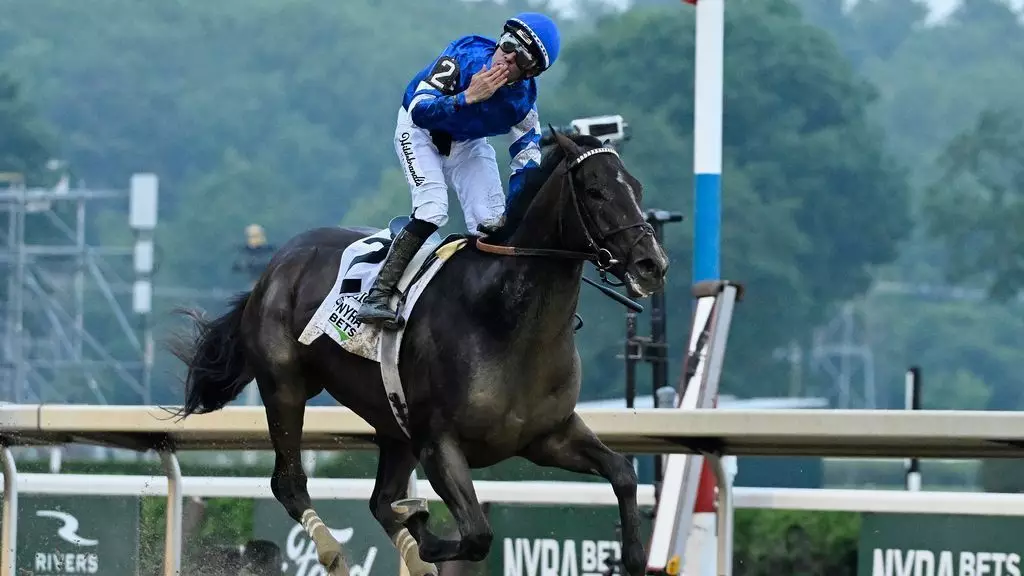Horse racing, a spectacle steeped in history and tradition, often tantalizes fans with the narratives that unfurl within its confines. The Belmont Stakes exemplified this during its latest iteration at the Saratoga Race Course, demonstrating how victory intermingles with the hard choices behind the scenes. The clash of equine titans drew not just the sport’s aficionados but also the casual observer, reminding us that horse racing is not only about the horses; it is about the connections between horses, their trainers, and the audacious dreams that fuel the sport. In an era dominated by fast-paced entertainment, the racing world remains a slow-burn testament to ambition and hope.
The Showdown of Sovereignty and Journalism
On that fateful Saturday, fans witnessed a thrilling rematch between Sovereignty and Journalism—two horses sporting impressive resumes and fierce competitive spirits. Both have become key players in this latest chapter of the Triple Crown saga, illustrating that the narrative of rivalry is one of the race’s most captivating elements. Sovereignty’s victory was significant, not just because he claimed two legs of the coveted Triple Crown but also due to the strategic decision-making that led to his triumph.
Trainer Bill Mott’s revelation about targeting the Belmont Stakes reveals the strategic depth involved in race preparation. Mott’s leadership is a cocktail of careful planning and deep understanding of his horse’s capabilities. The decision to bypass the Preakness Stakes was not simply for the sake of competition; it reflected a profound commitment to the horse’s long-term health and performance. The notion that one can sacrifice immediate glory in absence of pressing impulses to achieve greatness is a lesson that resonates far beyond the racetrack.
Competing for the Future of the Horse
A critical takeaway from this year’s Belmont is the evolving philosophy surrounding horse racing. In stark contrast to some previous eras driven largely by the incessant pursuit of victory at every turn, Mott and Michael Banahan of Godolphin opted for a more compassionate, long-term approach. The decision to prioritize Sovereignty’s well-being has profound implications for the sport’s future, highlighting a growing movement away from overextending young athletes—whether human or equine. In this light, the strategy undertaken appears not merely practical, but also extraordinarily progressive.
Journalism, reigning as the only horse to have contested all three legs of the Triple Crown, found himself on the losing side once again. Yet, like a seasoned veteran, he maintained his stature and drew fans’ respect. However, merely finishing second raises questions about the rigors and expectations of competing in prestigious events. Should the emphasis remain solely on victory, or should we celebrate the resilience of contenders like Journalism who embody the spirit of persistence? Those contrasting perspectives fuel the ongoing discourse about the essence of competition itself.
The Triple Crown: A Modern View
With the Triple Crown’s last major victory dating back to 2018, a complex nostalgia permeates the atmosphere of these races. Expectations are tinged with longing; fans yearn not just for individual achievements but for the mythical spectacle that accompanies a Triple Crown champion. Sovereignty’s success indeed generates conversation around potential Triple Crown successors, even as the allure of that milestone looms larger each year without fulfillment.
The racers’ performances in the Belmont reflect more than just athletic accomplishments—they symbolize a tapestry of dreams woven through countless strategic decisions made by trainers, owners, and jockeys. Sovereignty’s fulfilling journey is not merely about the glory of winning; it embodies the sacrifices made along the way, specifically in choosing the right moments to step back rather than just pushing ahead in a relentless chase for victory.
Future Endeavors: Travers Stakes on the Horizon
As discussions about Sovereignty’s next ambitions turn to the Travers Stakes, the anticipation rises once again. Mott’s aspirations for a race he has yet to conquer spark excitement and lay the groundwork for future challenges. The Travers, much like its predecessors, will welcome both experienced contenders and fresh aspirations, possibly stirring another competition between Journalism and Sovereignty.
One can only hope that as these two horses meet again, they do so in an arena that honors not just speed, but also the journey they have undertaken. If society embraces a narrative that values growth over mere accolades, the groundwork for a brighter future in horse racing could very well emerge. As these horses continue down their paths, both on and off the racetrack, we must remember that their triumphs and challenges resonate deeply, reflecting the broader human condition in its pursuit of excellence and the balance we must find along the way.


Leave a Reply